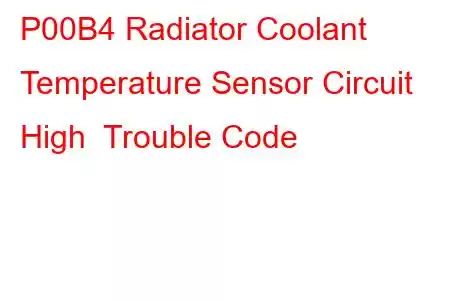P00B4 Radiator Coolant Temperature Sensor Circuit High
OBD-II Trouble Code Technical Description
Radiator Coolant Temperature Sensor Circuit High
What does that mean?
This generic powertrain diagnostic trouble code (DTC) typically applies to all OBD-II vehicles. That may include but is not limited to vehicles from Mercedes, Vauxhall, Nissan, BMW, Mini, Chevy, Mazda, Honda, Acura, Ford, etc.
The cooling system is an integral part of your vehicles engine system. It is responsible for not only monitoring your engine's temperature but also regulating it. It does this using various electrical and mechanical systems/components including but not limited to: Coolant Temperature Sensor (CTS), radiator, water pump, thermostat, etc.
The Engine Control Module (ECM) uses the CTS' values to monitor the engine's temperature and in turn, can regulate it accurately. Different temperatures require different air/fuel mixtures so it is imperative that the CTS is functioning within desired ranges. Most times, CTS' are Negative Temperature Coefficient sensors, which means, the resistance within the sensor itself decreases as the temperature rises. Understanding this will help you greatly when troubleshooting.
The ECM activates P00B1 and associated codes when it monitors one or multiples condition outside a specific electrical range within the CTS or it's circuit. The ECM may detect an issue that is not consistent which comes and goes (P00B5) From my experience, the culprit here tends to be mechanical. Keep in mind, electrical faults could be the cause as well.
P00B4 Radiator Coolant Temperature Sensor Circuit High code is set when the ECM monitors a high specific electrical value within the radiator CTS or it's circuit. It is one of five related codes, which are P00B1, P00B2, P00B3, P00B4, and P00B5.
What is the severity of this DTC?
This code would be considered a moderately severe issue. This will vary on what symptoms you have and how the fault is actually affecting your vehicles performance. The fact that the CTS's functionality directly influences the engine's air/fuel mixture, makes this an issue you do not want to leave unattended. Neglect this problem long enough, and you could be faced with some hefty engine repair bills.
An example of a radiator coolant temperature sensor:
What are some of the symptoms of the code?
Symptoms of a P00B4 diagnostic code may include:
Hard cold starts Erratic idle Engine stalling Poor fuel mileage Smoking exhaust Fuel smell Symptoms Erratic or false temperature readings Poor engine performanceWhat are some of the common causes of the code?
Causes for this code may include:
Defective radiator or other coolant temperature sensor (CTS) Dirty/plugged sensor pickup Sensor O-ring/Gasket leaking Broken or damaged wiring harness Fuse ECM issue Pin/connector problem (corrosion, melting, broken lock tab etc.)What are some P00B4 troubleshooting steps?
Be sure to check for technical service bulletins (TSBs) for your vehicle. Getting access to a known fix can save you time and money during diagnosis.
Tools
Some of the things you may need when diagnosing or repairing the radiator coolant temperature sensor circuits and systems:
OBD code reader Antifreeze/Coolant Drain pan Multimeter Basic socket set Basic ratchet and wrench sets Basic screwdriver set Battery terminal cleaner Service manualSafety Tips
Let engine cool Chalk wheels Wear PPE (Personal protective equipment)NOTE: ALWAYS verify and record the integrity of your battery and charging system before further troubleshooting.
Basic Step #1
First thing I would do if this code is set, would be to inspect the radiator coolant temperature sensor itself for any obvious signs of damage. Generally speaking, these sensors are mounted in the radiator or somewhere alon
Read: 49


